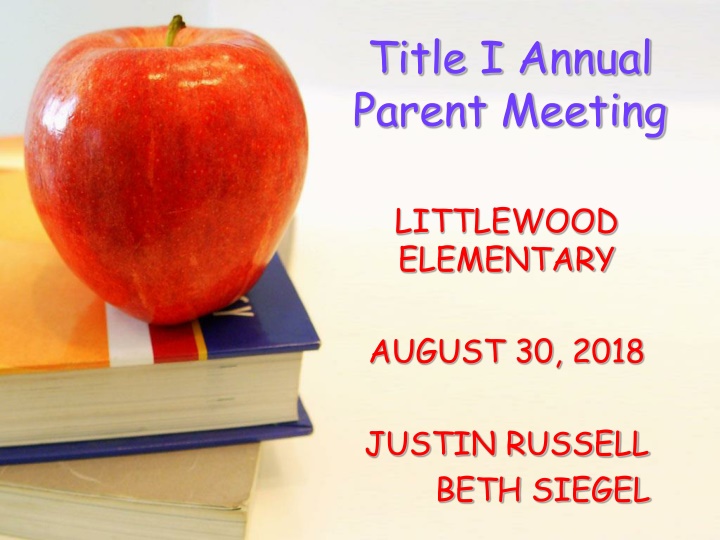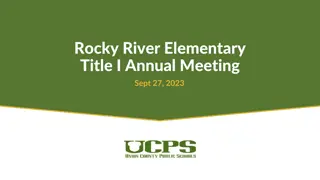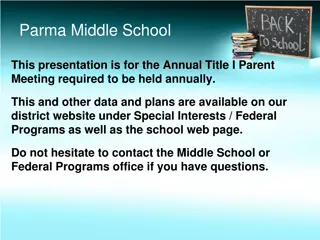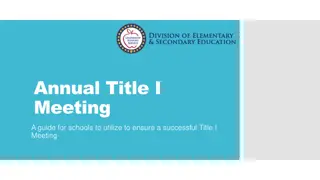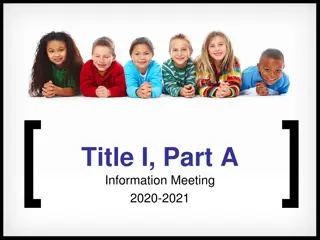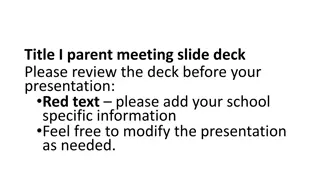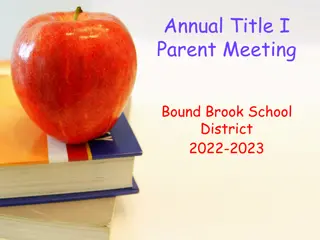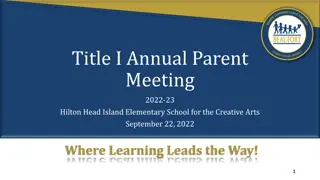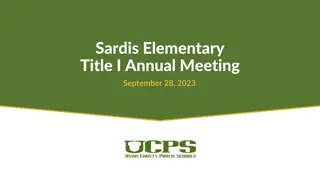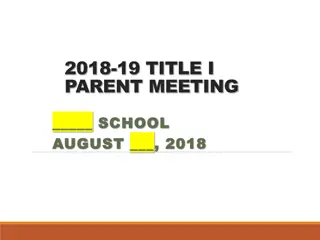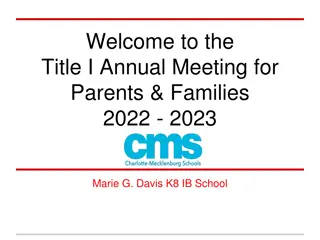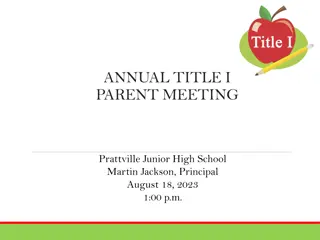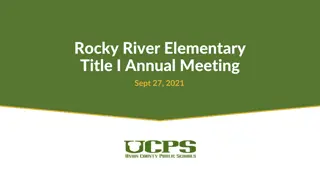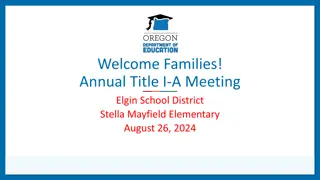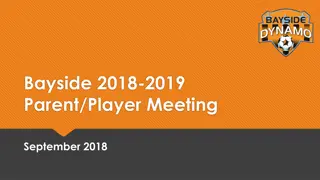Title I Annual Parent Meeting Highlights
The Title I Annual Parent Meeting at Littlewood Elementary focused on understanding the program, funding allocation, and supplemental support provided. It highlighted how decisions are made and encouraged parent involvement in decision-making processes.
Uploaded on Mar 04, 2025 | 0 Views
Download Presentation

Please find below an Image/Link to download the presentation.
The content on the website is provided AS IS for your information and personal use only. It may not be sold, licensed, or shared on other websites without obtaining consent from the author.If you encounter any issues during the download, it is possible that the publisher has removed the file from their server.
You are allowed to download the files provided on this website for personal or commercial use, subject to the condition that they are used lawfully. All files are the property of their respective owners.
The content on the website is provided AS IS for your information and personal use only. It may not be sold, licensed, or shared on other websites without obtaining consent from the author.
E N D
Presentation Transcript
Title I Annual Parent Meeting LITTLEWOOD ELEMENTARY AUGUST 30, 2018 JUSTIN RUSSELL BETH SIEGEL
Agenda Agenda Welcome and Introductions All About Title I Title I Budgets Standards and Testing Title I Beginning of School Packet Our Home-School Compact Our School s Parent & Family Engagement Plan Keys to Your Child s Success
What is Title I? What is Title I? Title I is the major component of the Elementary and Secondary Education Act (ESEA) and the largest federal assistance program for our nation s schools. The goal of Title I is a higher quality of education for every child. The program serves millions of children in elementary and secondary schools each year.
How Title I Works? How Title I Works? Title I funding flows from the U.S. Department of Education (as appropriated by Congress) to the Florida Department of Education (FLDOE). The FDOE allocates funds to the District. The District identifies eligible schools and allocates Title I funding to those schools based on the number of Children from Low-Income Families (CLIF). Title I schools spend the funds allocated based on formalized School Improvement Plans approved by District and FLDOE. Our School implements a schoolwide program.
Title I Funds Provide Supplemental Support Title I Funds Provide Supplemental Support Our School s Title I funds provide the following supplemental support: Additional Personnel to support our students and teachers Additional classroom materials and equipment Technology Supplemental computer programs: IXL / Imagine Learning / SmartyAnts Supplemental curriculum Small group intervention After school tutoring Additional Staff Development Title I funds also provide for Parent-Family Engagement activities and trainings throughout the year as well as: Resources in our Parent & Family Resource Area Student Planners
Who decides how funds are used? Who decides how funds are used? The school s leadership makes personnel and instructional decisions based on the specific needs of its student population. Parent input into the decision making process is encouraged through various means including: School Advisory Council (SAC) composed of Parents, Community members, Teachers, Other staff that works at the school, and Principal Parent input meetings for the development of the Home-School Compact and the school s Parent-Family Engagement Plan Input Evaluations of Parent-Family Engagement activities and trainings
Where can I find a copy of the Title I Where can I find a copy of the Title I Budgets? Budgets? The Title I Budgets, including Part A Basic and Parent & Family Engagement must be discussed with parents and documented by minutes from this Title I Annual Parent Meeting. A copy of the school s Title I Budgets (Part A Basic/PFE) must be in the Parent & Family Resource Area Notebook located in Conference Room B in the front office.
Parent & Family Resource Area Parent & Family Resource Area An area/room has been established to house resource materials for parents and families to access as needed. This area/room contains a variety of informational and academic materials for parent to take and use with their student at home. Our Parent & Family Resource Area is located in Conference Room B in the front office.
Working together! Working together! The Every Student Succeeds Act (ESSA) requires that all Title I schools and families work together. How we work together is listed in our Beginning of School Packet: District Parent-Family Engagement Plan School Level Parent & Family Involvement Plan Home-School Compact Which will be discussed with you during classroom visitation and Parent-Teacher Conferences School Improvement Plan This information packet is sent home to all families by each Title I school via your student s backpack and can be found in the Parent & Family Resource Area Notebook
Parent & Family Engagement Plan Parent & Family Engagement Plan Guidelines Guidelines As a parent or family member you are vital in the development, implementation, and review of the parental and family engagement program at our school. So that you can be as active as possible in your child s school success we will: Convene this Annual Meeting to inform you of Title I program requirements and your rights to be informed and involved regarding this program Provide families with timely information regarding Parent & Family Engagement Activities and Trainings. Offer activities and trainings at flexible times to maximize participation Assist families in understanding academic content standards, assessments, and how to monitor and improve the achievement of their children. Provide materials and training to help you work with your child to improve his or her achievement. Inform you where to locate the Title 1 Complaint Procedures
Educational Standards Educational Standards Florida s academic content standards establish high expectations for all students. Florida State Standards and Next Generation Sunshine State Standards will identify what your child needs to know and be able to do in all content areas at each grade level. Information located at: www.fldoe.org/bii/curriculum/sss/
Schools Curriculum School s Curriculum The Florida Standards form the framework student knowledge in: English Language Arts (ELA) Reading/Writing/Speaking & Listening/Language Mathematics Literacy in Social Studies Next Generation Sunshine State Standards form the framework for science.
Measuring Student Success Measuring Student Success Quarterly District-wide assessments intended to measure mastery of material and aligned with standards and benchmarks taught during each quarter will be given in the following areas: English Language Arts: grades K-8 Math: grades K-8 Science: grades 3-8
Florida Standards Assessment (FSA) Florida Standards Assessment (FSA) Grades 3 Grades 3- -11 11 Students are tested on: FSA English Language Arts / Writing Component: grades 4 - 11 FSA English Language Arts: grades 3-11 FSA Mathematics Grade 3-11 NGSS Science Grades 5 and 8.
Parents Parents Right to Know Right to Know It is your right to: Be involved and request regular meetings to express your opinions and concerns Be provided information on your child s level of achievement on state assessments in reading/language arts, writing, mathematics, and science Request and receive information on the qualifications of your child s teacher Be informed if your child is taught by a Non-Certified Teacher for four or more consecutive weeks
Your Involvement is Key to Your Involvement is Key to Your Child s Success! Your Child s Success! You are your child s first teacher. You have the ability to influence your child s education more than any teacher or school. You know your child best: Share information about your child s interests and abilities with teachers Ask to see FSA results, AIMS results, and Progress reports Discuss these results with your child s teacher so that you understand how to help your child at home Be knowledgeable of grade level expectations
Classroom Visits Classroom Visits Teachers will provide specific information on: Florida Standards Assessment Next Generation State Standards Grade Level Expectations Grade Specific Curriculum Measuring Student Success Definition of Proficiency Overview of their plans for the year Review the Home-School Compact Home-School Communication Systems
Questions? Questions?
Thank you for attending. Thank you for attending. Be sure to sign/complete: Title I Annual Meeting Evaluation Form The Title I Parents Rights Letter Home School Compact (return both of these to your child s teacher)
